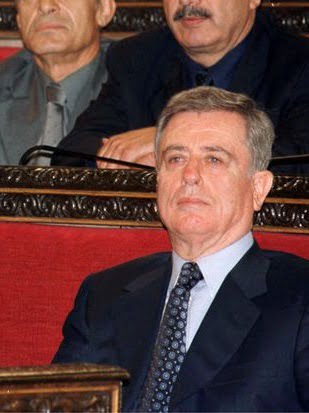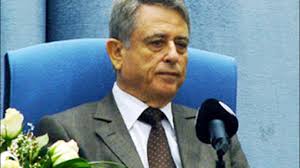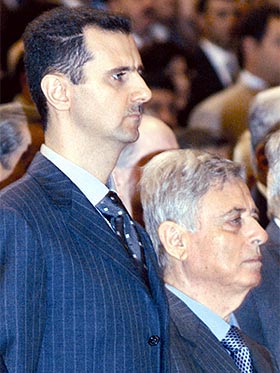The Party Has Not Closed the Door to Any Entity Seeking to Cooperate for the Benefit of the Country
As part of Syria’s development and modernization project, the Ba’ath Party had to re-evaluate itself in an intellectual pursuit tied to local, regional, and global developments across all levels brought about by these changes. Consequently, several committees were formed within the party to examine and propose intellectual ideas aimed at developing the party to adapt to these changes and work within them.
In this meeting with Mr. Abdel Halim Khaddam, the Vice President, the discussion covered everything related to the development of Ba’athist thought, its reasons, and requirements.
The Regional Leadership has formed working groups to study the development of the Ba’ath Arab Socialist Party’s thought. Does the development address the party’s obstacles and in which direction?
After more than forty years of the party leading Syria, and particularly following the significant changes in society—culturally, socially, and politically—alongside major international political, cultural, security, and scientific developments and their impact on the Arab nation and Syria, there is a need for review and development. This is to enable Syria to continue its advancement, avoid the negative aspects of major global changes, and benefit from their positives. Development or modernization is a natural state and a fundamental condition for progress and advancement, whereas stagnation is an exception that leads to paralysis and weakness.
The development addresses the party’s thought, not its doctrine. Here, it is important to distinguish between doctrine and thought. Doctrine is related to destiny and identity, as expressed in the party’s fundamental principles, while thought is what the mind produces to meet the requirements of a particular phase. Thus, it evolves with the factors and components of each stage.
The Corrective Movement’s Thought and Its Current Relevance
The Corrective Movement had its own ideology that distinguished it from the ideology prevailing in the party after the March 1963 Revolution. What were the foundations upon which the party’s thought was established, and how did its phased approach develop? Is this thought still relevant to the current stage?
After the Ba’ath Arab Socialist Party took control of Syria on March 8, 1963, especially following the February 1966 movement, a theory emerged within the party calling for exclusive party leadership in political affairs and country development, as it was considered a revolutionary party. This led to the party’s dominance in the political arena, with significant impacts on the country’s general life, affecting individuals and society.
Following the June 1967 setback, a crisis arose within the party regarding how to address the occupation and aggression, resulting in two main factions:
- The first faction, led by the regional leadership, advocated for more stringent internal, Arab, and international policies.
- The second faction, led by President Hafez al-Assad, argued that the aggression targeted the homeland. Therefore, it emphasized the need to strengthen national unity, open up to political, cultural, and economic forces in society, and rebuild the internal front as essential steps in confronting the aggression. This faction viewed the stage as one of national liberation.
The Corrective Movement defined the stage’s identity and, consequently, its requirements: a strong and cohesive internal front, Arab solidarity, and international openness.
Domestically, the party launched the following initiatives:
- Party Pluralism: Recognizing existing parties at the time and forming a national alliance within the Progressive National Front, which participated in governance.
- Establishing a Permanent Constitution: Drafting and implementing a permanent constitution for the country.
- Holding Elections: Conducting elections for the People’s Assembly.
- Economic Pluralism: Embracing economic pluralism and making significant strides in infrastructure development, economic and social development, as well as in education and healthcare.
However, some objectives set by the party after the October 1973 War were delayed and later stumbled due to internal and external factors that hindered the implementation of the party’s post-Corrective Movement approach. These obstacles included negative behavioral phenomena in certain areas, exploiting the party and state leadership’s focus on external factors affecting Syria directly, such as the Lebanese civil war, strained relations with Egypt over its agreements with Israel, severe tensions with Iraq, the Israeli invasion of Lebanon, the Iraq-Iran war, and the violent actions of the Muslim Brotherhood between 1969 and 1982 and their direct impact on domestic policies.
These internal and external obstacles had significant effects on the overall state situation.
In conclusion, the defining feature of the current stage remains one of national liberation. However, the approach to dealing with it needs to be reviewed due to the massive changes in the factors shaping Arab, international, and domestic conditions.
The review is not about the objectives but about the thought upon which the approach to achieving these objectives should be based.
The party issued an election law in 1972, and elections were held. The first, second, and third experiments were based on closed lists of the Front’s parties.
The goal of the elections was to involve the people in building constitutional institutions. However, the practical application of the electoral process did not align with the leadership’s goal, which later decided to open one-third of the Front lists to candidates outside the Front. This aimed to develop political life and open the door for new elements to enter politics. However, in practice, the segment the leadership hoped to see in the People’s Assembly did not succeed, as wealthy individuals managed to secure most of the seats through financial means.
This situation leaves a question for the leadership on how to ensure the achievement of elections in the most effective manner, which should be addressed by the development issue.
In summary, fundamental factors have emerged over the past thirty years that require review, and thus laying the intellectual foundation for this review in light of the nation’s and Syria’s interests.
Is It True That the Ba’ath Arab Socialist Party Will Transform into a Syrian Party?
This is not true, neither remotely nor closely. Abandoning the party’s national dimension would mean abandoning its identity, history, and future. What is being discussed is the development of the party’s working formula on a national level, to align with the current stage’s requirements in the national domain.
Freedom is a fundamental pillar of the Ba’ath Arab Socialist Party. However, throughout the party’s history since March 8, phenomena have emerged that conflict with this fundamental principle. Will the development address the concept of freedom?
Freedom is a natural right for humans, and there should be no restriction on freedom except freedom itself, meaning that an individual’s freedom ends where another’s freedom begins, as it also ends where the community’s freedom begins. Without this understanding of freedom, society would become a jungle, and the international community would turn into a broad arena of national conflicts.
The natural law that grants freedom to individuals and groups also restricts their freedom to prevent conflicts between individual and group freedoms.
In addition to those restrictions arising from freedom itself, there are other restrictions imposed by the state within the framework of natural law of freedoms. These are natural restrictions, and sometimes restrictions that conflict with the natural law of freedom.
There are also restrictions imposed by society through its values, customs, traditions, and heritage. Others are imposed by economic needs of individuals, and others by religion. Thus, restrictions are diverse, some are healthy, and some are arbitrary.
In response to your question, yes, there have been some incorrect practices, not due to party or state policy, but due to human errors by individuals, or due to the coercive security circumstances imposed on the country to ensure the protection of community safety and its members, or due to the weakness of oversight and accountability mechanisms.
Naturally, the review will address the concept of freedom based on citizens’ rights to freedom of thought, expression, and participation, provided it does not conflict with others’ freedom or the interests of the community.
The Party’s Theory of Popular Democracy: Is It Still Valid?
Let me say that democracy is a national need because it provides a framework for individuals and groups to exercise their freedoms and participate in choosing their constitutional institutions. It is also the framework that ensures balance among authorities and facilitates oversight on the performance of executive bodies in government, thereby ensuring effective work and good performance.
The term “popular democracy” is borrowed from countries of the former socialist bloc. Democracy is a framework for practice, and this framework is not uniform across all peoples; it is linked to economic, political, and cultural factors, which is why we see various forms of democracy.
Democracy requires the existence of parties. How will this situation be addressed?
Yes, democracy requires the presence of parties, programs, and a conducive environment. The leadership is giving great attention to this issue in the review of developing the party’s thought.
There are rumors about the party abandoning socialism. What is the truth of this?
I would like to point out that the party adopted socialism as a core principle, but it did not formulate a socialist theory.
Socialism is a path to achieving societal progress, advancement, justice, equality, improving the living standards of the people, creating job opportunities, and providing healthcare and education.
Socialism is not about conflict between social strata, especially in the stage of national liberation, which requires a high level of national unity to confront aggression, achieve liberation, and maintain national independence. It is a system that ensures social solidarity among societal groups, guaranteed by the state. Therefore, it is not about equalizing people in poverty but about removing injustice, improving living standards, preserving individual dignity, providing opportunities for a decent life, and working to eliminate poverty. It is, thus, about abundance in production and fairness in distribution.
Socialism is not an absolute concept because the absolute is impossible. Instead, it is a relative concept linked to the community’s requirements and needs, including national defense needs.
The state is responsible for providing and securing the community’s requirements and needs.
Is the State, with Its Natural Resources and Progressive Tax System, Capable of Meeting Requirements Given the General Economic Situation?
A realistic study of the economic and social conditions reveals that resources fall short of meeting basic needs. If we examine the average annual income of an individual, we see a deep gap between the minimum needs of citizens and their resources, as well as between the minimum needs of the country and its resources.
The solution is not to end the state’s role in the national economy or to adopt a market economy system, which has led to social disasters, but rather to reconsider our economic concepts. The goal of socialism is to meet the community’s requirements and the country’s needs.
When resources fall short of the minimum threshold, we must seek solutions to provide these resources. This is what China, the largest communist country known in history, has done.
The way to achieve this is by providing investment opportunities in economic development and launching economic reforms that lead to increased production and fairness in distribution. This will enhance state resources and contribute to raising the annual income rate per individual.
Socialism guarantees basic needs such as justice, health, and job opportunities. It is not about stagnation that increases poverty and weakens the state, or widening the gap between us and our adversaries, and between us and our neighboring countries and the world.
The comparison between the average income per individual in Israel and that in Syria is alarming and can only be addressed by a new, revolutionary understanding of socialism, similar to what countries like China and Vietnam have done. These are countries with undisputed socialist ideologies and leadership, many of whom experienced the construction of the communist system in both countries.
Some People Talk About the Need for a National Dialogue; What Is Your Opinion on This?
First, it is important to distinguish between national dialogue and political dialogue. National dialogue occurs in a country facing threats to its national unity, either through division, civil war, or during a civil war, as seen in Lebanon with national dialogues like the Taif Conference. I am confident that all Syrians are committed to their national unity, and there is no national disagreement or division.
Political dialogue, on the other hand, involves political forces or figures agreeing on a political program to be implemented.
The party has not closed the door to any entity that seeks to cooperate with it for the benefit of the country, within the framework of the fundamental national principles adopted by the party.
There are calls to cancel a constitutional provision that states the principle of the Ba’ath Party’s leadership of society and the state. Will the development process address this principle?
We need to distinguish between the process of developing the party, the state, and society, which is a national necessity and a right of every citizen to contribute to and express opinions on, and the process of changing the system and replacing it with a new one.
The first case, as I said, is a national necessity emphasized by President Bashar al-Assad and confirmed by the party leadership, which is working diligently to achieve it while considering all the objective factors required for development in all fields: political, economic, cultural, and scientific. I believe it would be beneficial to include the contributions of various political currents and forces from the Arab world and Syria in party conferences as observers, which would enrich the discussion and clarify the vision.
The second case, which calls for changing and replacing the system, is proposed by one of two types of people: either someone who does not understand the risks to the country’s future, security, and stability and is unaware of what might happen afterward, or someone who is aware of the dangerous consequences and seeks them for reasons unrelated to the country’s interests but beneficial to external projects and, secondly, Israel. This would remove the state that has borne the burden of resisting the Zionist project. Despite all the difficult circumstances, Syria has remained cohesive with its national and pan-Arab principles.



